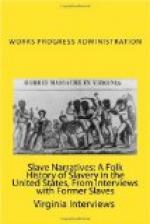With changed expression he told of an incident during the Civil War: Slaves, he explained had to have passes to go from one plantation to another and if one were found without a pass the “patrollers” would pick him up, return him to his master and receive pay for their service. The “patrollers” were guards for runaway slaves. One night they came to Aunt Rhoda’s house where a crowd of slaves had gathered and were going to return them to their masters; Uncle Umphrey the tanner, quickly spaded up some hot ashes and pitched it on them; all of the slaves escaped unharmed, while all of the “patrollers” were badly injured; no one ever told on Uncle Umphrey and when Aunt Rhoda was questioned by her master she stated that she knew nothing about it but told them that the “patrollers” had brought another “nigger” with them; her master took it for granted that she spoke the truth since none of the other Negroes were hurt. He remembers seeing this but does not remember how he, as a little boy, was prevented from telling about it.
Asked about his remembrance or knowledge of the slaves’ belief in magic and spells he said: “I remember this and can just see the dogs running around now. My mother’s brother, “Uncle Dick” and “Uncle July” swore they would not work longer for masters; so they ran away and lived in the woods. In winter they would put cotton seed in the fields to rot for fertilizer and lay in it for warmth. They would kill hogs and slip the meat to some slave to cook for food. When their owners looked for them, “Bob Amos” who raised “nigger hounds” (hounds raised solely to track Negro slaves) was summoned and the dogs located them and surrounded them in their hide-out; one went one way and one the other and escaped in the swamps; they would run until they came to a fence—each kept some “graveyard dust and a few lightwood splinters” with which they smoked their feet and jumped the fence and the dogs turned back and could track no further. Thus, they stayed in the woods until freedom, when they came out and worked for pay. Now, you know “Uncle Dick” just died a few years ago in Sparta, Georgia.”
When the Civil War came he remembers hearing one night “Sherman is coming.” It was said that Wheeler’s Cavalry of the Confederates was always “running and fighting.” Lane had moved the family to Macon, Georgia, and they lived on a place called “Dunlap’s Hill.” That night four preachers were preaching “Fellow soldiers, the enemy is just here to Bolden’s Brook, sixteen miles away and you may be carried into judgment; prepare to meet your God.” While they were preaching, bombs began to fly because Wheeler’s Cavalry was only six miles away instead of 16 miles; women screamed and children ran. Wheeler kept wagons ahead of him so that when one was crippled the other would replace it. He says he imagines he hears the voice of Sherman now, saying: “Tell Wheeler to go on to South Carolina; we will mow it down with grape shot and plow it in with bombshell.”




